The Election Programmes Code only applies to election programmes that are broadcast on television or radio during the general election period. Usually, ‘election programmes’ will appear as short promotional / campaign clips for political parties or candidates, broadcast on TV or on radio.
Other agencies such as the ASA, Electoral Commission and NZ Media Council, also deal with election-related complaints. If we cannot assist you we will ensure you are referred to the agency that may be able to assist you.
For a guide to who handles what, see this video.
Make an Election Programmes Complaint
If you would like to make a complaint to BSA about an election programme, please use our online form or contact us. To check which organisation should handle your complaint see here.
Guidance on the Election Programmes Code
Election Programmes Code
The Broadcasting Act 1989 requires every broadcaster to be responsible for maintaining in programmes and their presentation, standards which are consistent with matters such as good taste and decency, law and order, and privacy.
The Broadcasting Standards Authority (BSA) is responsible for administering the standards regime, determining formal complaints and encouraging broadcasters to develop and observe appropriate Codes of Broadcasting Practice.
The purpose of this Code of Broadcasting Practice is to emphasise important principles regulating the content of broadcast election programmes. Broadcasters are responsible for ensuring any broadcast election programmes comply with broadcasting standards.
Under section 14 of the New Zealand Bill of Rights Act 1990, there is a right to freedom of expression. This is an important right in a democratic society and is particularly important in the lead up to a general election, when political parties and candidates are seeking to influence voters, and audiences are seeking information to enable them to make informed voting decisions. When the Authority makes decisions on complaints, it will consider and apply the New Zealand Bill of Rights Act.
A complaint may be made directly to the BSA where it is considered that an election programme does not comply with one or more of the broadcasting standards contained in this Code. The BSA will endeavour to address such complaints on an urgent basis.
Election programmes are subject to the same broadcasting standards as other programmes.
Therefore, this Code should be read alongside the Code of Broadcasting Standards in New Zealand. The Code is available free from the Broadcasting Standards Authority and can also be downloaded from www.bsa.govt.nz. There is one exception to this: the requirement to present a range of significant viewpoints on controversial issues of public importance (the ‘balance’ standard in the Code) does not apply to election programmes (see section 73 of the Broadcasting Act).
In recognition of the special context of general elections, broadcasting standards such as fairness and accuracy will be applied to election programmes in a manner that respects the importance of free political expression and debate.
Complaints about election programmes are made directly to the BSA.
‘Election programme’ means a programme that:
- encourages or persuades, or appears to encourage or persuade, voters to vote for a party or the election of a constituency candidate; or
- encourages or persuades, or appears to encourage or persuade, voters not to vote for a party or the election of a constituency candidate; or
- advocates support for a constituency candidate or for a party; or
- opposes a constituency candidate or a political party; or
- notifies meetings held or to be held in connection with an election.
(see section 69 of the Broadcasting Act).
Election programmes will appear as short promotional/campaign clips or advertisements/advertorials broadcast on television or on radio, for political parties or constituency candidates. Complaints about these programmes may be made directly to the BSA.
The Court of Appeal has clarified that election programmes are only those that are broadcast for political parties or candidates – and are not programmes initiated by broadcasters or other third parties (The Electoral Commission v Watson & Jones, CA239/2015 [2016] NZCA 512, 20 October 2016).
Other programmes about election matters (such as news, comment, current affairs, entertainment or documentaries) are not subject to the Election Programmes Code. However, they must still comply with other relevant broadcasting standards which are contained in the Code of Broadcasting Standards in New Zealand. Complaints about such programmes must be made first to the broadcaster.
‘Election’ means a general election or by-election for members or a member of the House of Representatives. Local body elections are not covered by the Election Programmes Code.
Election programmes can only be broadcast during an ‘election period’ (the period beginning with writ day (the day an election is announced) and ending with the close of the day before polling day).
OTHER TYPES OF ELECTION ADVERTISING: ADVERTISING STANDARDS AUTHORITY
Election advertising in media other than television and radio (such as print, billboards, pamphlets, cinema and online – including social media) is not covered by this code.
Election advertising in any media (including television and radio) by third parties (ie not candidates/political parties themselves) is also not covered by this code.
Complaints about such election advertising may, where permitted, be made to the Advertising Standards Authority.
EDITORIAL ELECTION CONTENT: MEDIA COUNCIL
Complaints about election matters in editorial content in New Zealand Media Council member publications may be made through the New Zealand Media Council complaints process.
ELECTORAL COMMISSION
Complaints or questions regarding other requirements relating to election programmes (under the Broadcasting Act) or election advertisements (under the Electoral Act), such as promoter statements, funding, and authorisation, should be addressed to the Electoral Commission.
Further guidance about election related content and where complaints should be made is available on the Broadcasting Standards Authority website (www.bsa.govt.nz).
Formal complaints allege that the broadcaster has failed in its responsibility to maintain one or more of the following broadcasting standards:
STANDARD E1 - Election Programmes Subject to Other Code
STANDARD E2 - Election Programme Advocacy - Distinguishing Factual Information from Opinion or Advocacy
STANDARD E3 - Denigration
STANDARD E4 - Misleading Programmes
Formal complaints about an election programme must be:
- made in writing
- lodged directly with the BSA within 60 working days of the broadcast.
Formal complaints should specify:
- that the complaint is a formal complaint about an election programme
- the name of the programme
- the party or candidate featured in the broadcast
- where the broadcast was featured (eg station or channel)
- the date and time of broadcast
- the standard(s), from this Code and/or the Code of Broadcasting Standards in New Zealand, alleged to have been breached and the reasons why.
All broadcasting codes are available from the BSA and from its website.
While complainants have 60 working days to lodge a complaint the nature of election programmes means that complaints are most effectively brought as soon after the broadcast as possible.
An election programme is subject to all relevant provisions of the Code of Broadcasting Standards in New Zealand except for the requirement to present a range of significant viewpoints on issues of public importance.
Robust debate, advocacy and expression of political opinion are a desirable and essential part of a democratic society and broadcasting standards will be applied in a manner which respects this context.
Guidelines:
E1a In addition to any specific guidelines in this code, guidelines and commentary in the Code of Broadcasting Standards in New Zealand will inform the assessment of programmes under this standard E1.
E1b Accuracy Standard Assessments:
- Promises as to future conduct (eg election promises), being neither statements of fact nor opinion, are not capable of being assessed against the accuracy standard. These statements should be considered under standard E2. However, factual statements on which a future promise is based, may be subject to the accuracy standard.
- The assessment of whether any election programme statement amounts to a material point of fact or is misleading will be guided by how a reasonable viewer or listener would interpret it in the context of an election campaign (ie would a reasonable viewer or listener interpret the statement literally or as a transparent promotion of party/candidate policies or encouragement to vote a particular way).
- The assessment of whether the accuracy requirements have been met will be undertaken on a statement by statement basis (and then in the context of the programme as a whole).
- The following contextual factors may be relevant:
- the use of short hand or hyperbole for advocacy effect
- whether the relevant statement related to an election issue or party policy that viewers or listeners could reasonably be expected to be aware of (lessening the chance of being misled).
An election programme may include debate, advocacy and opinion, but factual information should be clearly distinguishable from opinion or advocacy.
Factual information must be able to be substantiated.
Guidelines:
E2a Evidence (eg academic studies, expert opinion) in support of factual information must be appropriate and robust and must be readily available and obtainable.
E2b Election advertisements that promote a party’s or candidate’s policy promises are, by their very nature, highly political, often hyperbolic vehicles for advocacy, rather than factual information (and are generally readily distinguishable as such).
E2c Compliance against this standard is to be assessed on a statement by statement basis (and then in the context of the programme as a whole).
E2d The assessment of whether a statement is clearly distinguishable as factual information or opinion or advocacy may include consideration of:
- the context and presentation (including tone) of the programme
- the precision (exact wording) of the statement
- whether the statement can be proven right or wrong (a fact) or is contestable or someone’s view (opinion or advocacy)
- how a reasonable viewer or listener would perceive it
- the political identity, reputation and policies of the party/candidate promoted in the programme
- whether the statement can reasonably be interpreted as an expression of political opinion or advocacy, designed to persuade voters to vote for a party/candidate
- whether the particular point was the subject of substantial other coverage (eg on television, radio or other platforms) through which viewers or listeners could reasonably be expected to be aware of alternative views and opinions to consider in making their voting decision.
While an election programme may oppose a political party, or candidate, it may not include material which denigrates a political party or candidate.
Guidelines:
E3a “Denigrate” is defined as devaluing the reputation of a political party or candidate.
E3b The importance of freedom of expression in the lead up to a general election, means a high level of condemnation, often with an element of malice or nastiness, will be necessary to conclude that a broadcast denigrated a political party or candidate in contravention of the standard.
E3c This standard is not intended to prevent the broadcast of material that is:
- factual
- a genuine expression of serious comment, analysis, opinion or advocacy for a political party or candidate
- legitimate humour or satire.
An election programme may not imitate an existing programme, format or identifiable personality in a manner which is likely to mislead.
Guidelines:
E4a The assessment of whether an election programme has imitated an existing programme, format or identifiable personality in a manner which is likely to mislead will be guided by how a reasonable viewer or listener would interpret it (ie would a reasonable viewer or listener realise they were watching election advertising which promotes a particular party or candidate).
E4b The assessment of programmes under this standard will include consideration of the following, where relevant:
- the nature and extent of any imitation
- whether party/candidate banners, slogans, advertising or similar identifying materials featured in the programme.
G1a The assessment of complaints made under this Election Programmes Code of Broadcasting Practice will take into account the particular importance of freedom of speech in the lead up to a general election. Given the high value placed on political speech in the lead up to an election, a correspondingly high threshold must be reached to conclude that an election programme has breached any standard under this code (ie the harm caused or potentially caused by the programme must be great).
ELECTION PROGRAMME COMPLAINTS
Broadcasting Standards Authority
PO Box 9213
Wellington 6141
Phone: (04) 382 9508
Freephone: 0800 366 996
Email: info@bsa.govt.nz
Web: www.bsa.govt.nz
ELECTION ADVERTISING COMPLAINTS
Advertising Standards Authority
PO Box 10 675
Wellington 6143
Phone: (04) 472 7852
Freephone: 0800 234 357
Email: asa@asa.co.nz
Web: www.asa.co.nz
EDITORIAL CONTENT COMPLAINTS
New Zealand Media Council
PO Box 10 879
Wellington 6011
Phone: (04) 473 5220
Freephone: 0800 969 357
Email: info@mediacouncil.org.nz
Web: www.mediacouncil.org.nz
OTHER ELECTION INFORMATION
Electoral Commission
PO Box 3220
Wellington 6140
Phone: (04) 495 0030
Email: enquiries@elections.govt.nz
Web: www.elections.org.nz
Download the Election Programmes Code and guidance
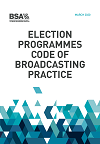
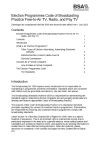
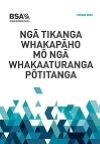


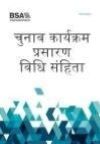
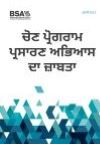

FREQUENTLY ASKED QUESTIONS
All FAQ's ›We address complaints about ‘election programmes’ on TV or radio, and decide if they breach the Election Programmes Code. These complaints can be made directly to the BSA and we deal with them via a fast-track process.
Only general elections or by-elections for MPs are covered by this Code.
The BSA also considers complaints about other programmes which may relate to the election (eg, news, current affairs, satire and comment), under normally applicable broadcasting standards. These complaints must first be made to the broadcaster, and then can be referred to the BSA if the complainant is dissatisfied with the response.
Complaints over requirements such as promoter statements, written authorisation, allocation of funding, timing of broadcasting, or expense limits are dealt with by the Electoral Commission. The Advertising Standards Authority and NZ Media Council also deal with complaints about election advertising and coverage.
For more information about who you should complain to, see our Who does what? elections guide.
The Broadcasting Act 1989 defines an election programme as a programme that is broadcast on TV or radio during an election period and:
- encourages or persuades, or appears to encourage or persuade, voters to vote, or not to vote, for a political party or a constituency candidate; or
- advocates support for, or opposes, a constituency candidate or political party; or
- notifies meetings held or to be held in connection with an election.
Only programmes broadcast for political parties or constituency candidates are considered election programmes, and these will usually appear as short promotional/campaign clips.
Programmes initiated by broadcasters or other third parties are not considered ‘election programmes’.
This means TV and radio programmes including news, comment, current affairs or comedy in relation to an election are not subject to the Election Programmes Code.
However, complaints about these programmes can be considered by the broadcaster under the normally applicable broadcasting standards, and then referred to the BSA if the complainant is not satisfied with the outcome.
If the item is a third party-initiated ‘election advertisement’, it may be subject to requirements under the Electoral Act. Complaints about these can be made to the Advertising Standards Authority.
Election programmes can only be aired during the ‘election period’. It’s an offence to broadcast an election programme for a party or candidate outside this period. Contact the Electoral Commission for more information.
It depends what your complaint is about:
- An election programme on TV or radio during the general election period: BSA
- An election advertisement in other media, including print, online, pamphlets or billboards: Advertising Standards Authority
- A programme discussing election matters on TV or radio (or on-demand, provided it was broadcast on TV or radio): the broadcaster (within 20 working days)
- Discussion of election matters in editorial content (as distinct from advertising) in NZ Media Council members’ publications: NZ Media Council
- Compliance with requirements such as promoter statements, written authorisation, allocation of funding, timing of broadcasting, or expense limits: Electoral Commission
If in doubt, check the table in our Quick Guide here.
If we receive a complaint that ought to be considered by the Electoral Commission, Media Council or Advertising Standards Authority, we’ll forward your complaint to them and let you know.